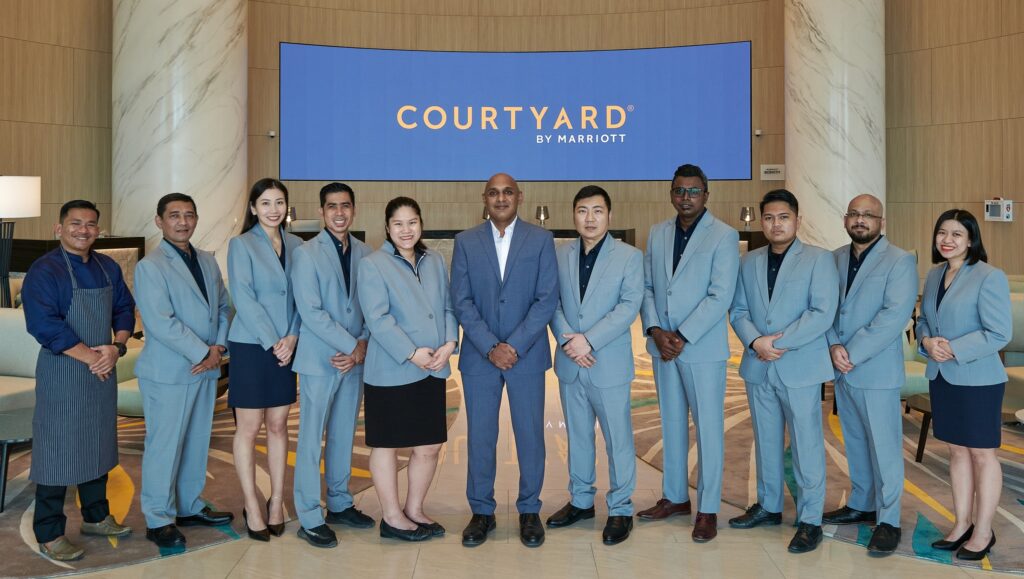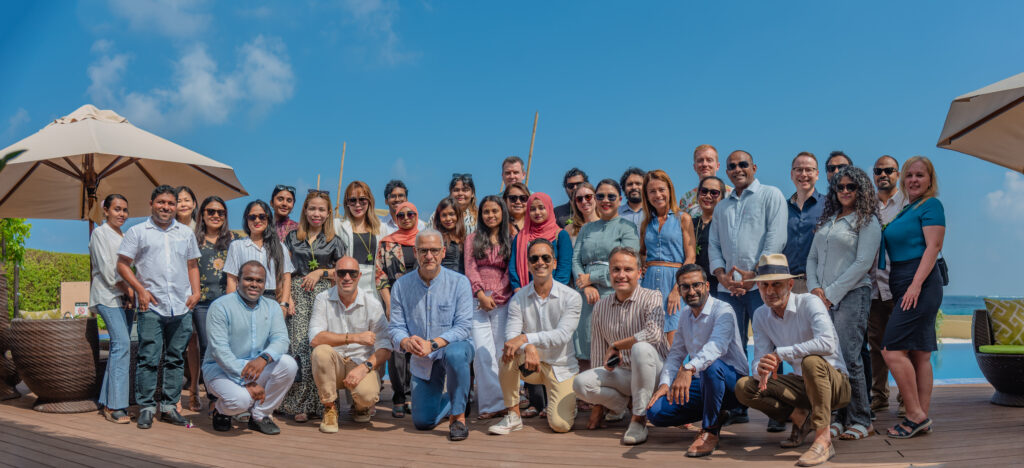Here’s how Marriott’s “win-win” approach puts its people first
TD Media speaks with Rivero Delgado, AVP – Singapore, Malaysia, Maldives, Marriott International
Contributors are not employed, compensated or governed by TDM, opinions and statements are from the contributor directly

The hospitality industry is currently facing a significant labour shortage worldwide. The industry, which includes hotels, restaurants, bars, and tourism, has been struggling to find and retain employees since the start of the COVID-19 pandemic.
Other factors may include a shrinking labour pool due to demographic changes or increased competition for workers from other industries. The shortage in the hospitality industry can have significant impacts on businesses and the economy as a whole. Thus, the hospitality industry is now exploring new ways to attract and retain talent, including increased wages, benefits, and flexible schedules.
Travel Daily Media interviewed Rivero Delgado, Area Vice President – Singapore, Malaysia, Maldives, Marriott International, about the staffing shortage faced by many hospitality companies and the best practices for finding the best team members.
Travel Daily (TD): During the pandemic, travel companies had to lay off employees to cope, and now many hospitality companies are facing the challenges of a staffing shortage. What is your opinion on this trend and what is Marriott doing to fill its own vacancies?
Rivero Delgado (RD): Indeed, this is a major challenge for the industry. The hospitality industry is encountering labour shortage issues as travel has resumed and hotels are experiencing strong demand. That being said, we do see more confidence returning to the industry and the talent situation is indeed much more stable than twelve months ago.
“Marriott International makes continuous efforts to attract, retain, and develop talent. This includes saying goodbye to the time when someone who joined as a bellboy would stay a bellboy.”
Marriott International makes continuous efforts to attract, retain, and develop talent. This includes offering incentives such as flexible work arrangements as well as career growth, saying goodbye to the time when someone who joined as a bellboy would stay a bellboy. As such, Marriott International is conducting a pilot project to multi-skill our Associates. Instead of having them fulfil one role, the hotels cross-train them across different functions. This is a “win-win” approach as it provides our associates with learning opportunities and at the same time enhances our guest service levels.
We are well prepared to weather a potential recession as we have solid plans in place to push us forward and achieve our business goals.
At Marriott International, we put people first and we believe in creating an inclusive and open work culture where all employees feel valued, heard, and respected. The importance of diversity, equality, and inclusion is ingrained in our DNA and it is our philosophy to prioritise these values in everything we do. One of the unique concepts we have is Business Councils in each country. This brings our associates together from the different Hotels to collaborate and work together on different initiatives such as CSR and fundraising activities.
When I consider the teams I work with and the hiring process, whether in resorts, city hotels, or corporate offices, my approach to leading a diverse team is based on a few principles like open and honest communication, celebrating diversity, leading by example and staying true to our company’s core values. Leading a diverse team in a multicultural environment requires a unique approach that values, respects, and recognizes the differences among team members. I always seek out individuals who are better than me and to ensure diversity I strive for a mix of different nationalities, talents, and exposure to different countries, as well as a balance of genders, although the priority is always talent first.

TD: What are the best practices for finding the right team members?
RD: When I get into a new role, the first thing I do is observe and my priority is human capital which means the associates that work for us are of the utmost importance. I will not be able to understand how much potential we have if I don’t understand the team around me and I always make sure that each of the associates is set up to be successful and focus on their strengths.
People form the bedrock of any organization and we must embrace a mindset of tapping the unique strengths and experiences of their people to truly grow. Different perspectives can spark creativity and innovation and help organizations spot and seize new opportunities. I enjoy developing talent and people. I always keep in mind that someone gave me an opportunity to grow and that I would like to do the same for others. It is also my duty to make sure I develop the talent I have with me and to prepare the pipeline of general managers for the company’s future.
TD: What has changed the most during your time in the travel industry? How does Marriott stay ahead of the curve?
RD: People have become more well-travelled, especially over the past recent decades. While travel used to be a luxury afforded by a handful in the past, it has become much more accessible today.
I think our Marriott Bonvoy portfolio of 30 brands and over 8000+ hotels globally have set up a strong foundation for leading the developments in the tourism industry. We aim to be the hallmark of hospitality and continue to work hard to maintain our status as an aspirational company to work for. This is credited to our strong values and the hard work of all the associates in the organization.
We take a lot of pride in delivering the high level of service that has come to be synonymous with Marriott International and prioritise positioning ourselves well and doing a good job to attract guests to our hotels. We then adjust our business model without compromising the guest experience and expectations, as this is how we do business.

TD: What hospitality trends in your area do you think we will see in the next two years? How is Marriott capitalising on these trends?
RD: We expect to see a continued strong rebound in travel and enhanced demand for luxury travel experiences. Asia Pacific is leading the growth and the company is quadrupling its footprint in Vietnam with a presence. Another marked growth area is the leisure footprint in Australia, Thailand, and the Maldives. Marriott is also seeing increased business travel and group activity in Singapore, South Korea, India and Indonesia.
Along with such a varied traveller mix sees a demand for different accommodation options. Marriott International has the benefit of fulfilling the whole spectrum of different customer needs with our vast portfolio of 30 iconic brands. In Asia Pacific alone, we are opening our 1,000th hotel this month and we have 700 more hotels in our signed pipeline. We actively look at building our brands and the latest example of this is the expansion of the Tribute Portfolio brand in Singapore with the opening of Serangoon House. The Tribute Portfolio is a growing family of characterful, independent hotels drawn together by an underlying passion for captivating design and drives to create vibrant social scenes for guests and locals alike. The Serangoon House in Singapore is a perfect addition to the collection, as one of the finest examples of Indian colonial design and interior architecture located in Singapore’s most vibrant ethnic district, Little India,
In the third quarter of this year, we are opening two hotels in Singapore – Aloft Singapore Novena will be the brand entry into Singapore and The Singapore EDITION, the very first brand entry into South East Asia.
“If anyone is thinking about joining the hospitality industry, I think it is extremely important that they visualise themselves and dream big.”
TD: For anyone looking to follow a similar career path to yours, what advice would you give them? What should they include in any job application?
RD: I am an advocate for anyone willing to join this industry. I always believe that we have the responsibility to encourage and convey the passion of the business to others. And if anyone is thinking about joining the hospitality industry, I think it is extremely important that they visualise themselves and dream big. Because in this industry, you can be whatever you aspire to be. It is important to make sure the company you work for follows the values and principles that are similar to yours, and then allow them to guide you, teach you and educate you on the business.
The hospitality industry is an industry that brings something very unique, unlike others. There is no routine, there is new discovery at all times. You stay connected with people, and you stay connected with travel to discover the world, and that is very unique to our industry. I am very passionate about what I do and I love being a hotelier and serving people.


Comments are closed.